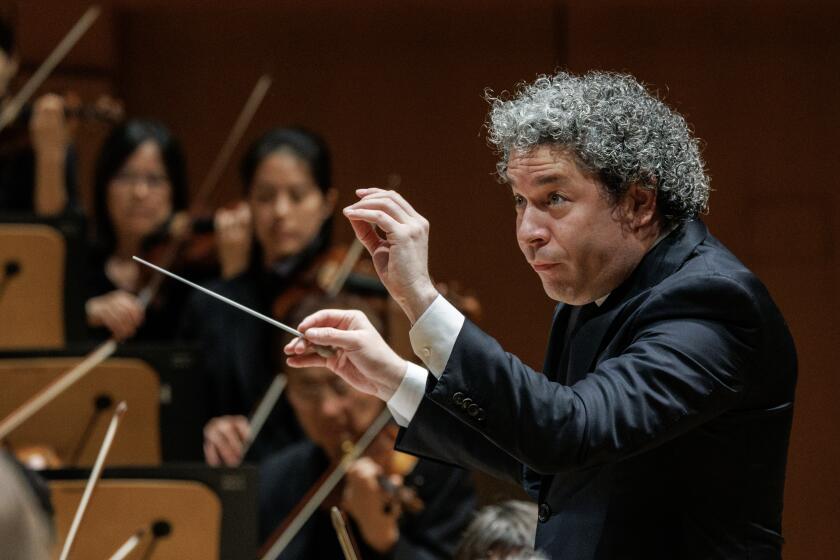Robert Goulet Becomes a ‘Man’
Robert Goulet’s speaking voice sounded softer than the diamond-hard baritone long familiar from his recordings and stage performances.
“I never wanted to do this role,” he was saying over the telephone the other day from his hotel suite in San Diego. “They asked me to do it, like, for 20 years now. And I kept saying, ‘No, no, no.’ ”
The 63-year-old star was talking about the dual character he plays--16th century Spanish writer Miguel Cervantes and errant knight Don Quixote--in “Man of La Mancha,” which opens Tuesday at the Orange County Performing Arts Center.
“I read the script and didn’t like it. I thought it was kind of boring and dark and brooding. I didn’t see the humor in it. It seemed pretty dreary.”
Goulet has said this time and again since September, when the show went out on the road. It’s not that he likes repeating himself, it’s just that it’s the honest answer to the question he keeps getting asked one way or another at every stop: How come, having toured successfully in such Broadway chestnuts as “Camelot” and “South Pacific,” he had never given this one a whirl until now?
Goulet said that he merely was following the expert advice of two actors he trusted. It was Richard Kiley, the Tony Award-winning originator of the Cervantes/Quixote role in the original 1965 production, who warned him off in the first place, he said. And it was Hal Holbrook, who also played the role on Broadway, who seconded Kiley.
“I was once in something with Richard and Hal, and we were all in the same dressing room ready to go on, and I said to Richard that I’d been asked to do this show.
“Richard said, ‘Don’t do it.’ And Hal chimed in, saying the same thing. They both said it’s too tough. You’re out there [onstage] 95% of the time. You have to concentrate every minute. You can’t sit back and say to yourself, ‘Uh, what am I going to do tomorrow on the eighth hole?’ ”
What changed Goulet’s mind about playing Cervantes/Quixote seems less clear.
“I’m probably the right age now,” he said.
“I’m a better singer than ever,” he added. “My voice is better, and I understand what I’m doing better, what the lyrics mean, what the song is that I’m trying to sell.”
And he now appreciates the humor in the show.
“I’m counting my laughs,” he said. “Of course, you can’t play this character only for laughs. It’s just that I’m getting some.”
All of which doesn’t quite answer the question.
Perhaps more to the point, though it went unspoken, is that Goulet, who won a 1968 Tony as best actor in a musical in “The Happy Time,” makes an extraordinary living from touring in Broadway productions.
As the star of a 1993-94 “Camelot” tour that ran for 22 months in 50 cities, Goulet earned a reported $80,000 a week, according to the New York Times. He played King Arthur (the Richard Burton role), not Lancelot (the role Goulet originated in 1960).
Moreover, what had been the bread and butter of his career for many years--the high-profile Las Vegas nightclub circuit--no longer exists, at least not in a style suitable for him.
“There are no Vegas shows today,” he explained. “It’s all family-oriented now. They have these productions that are meaningless as far as I’m concerned.
“I’m not going stay in Vegas”--Goulet and his third wife, Vera, own a home there--”and do their kind of productions. If I’m in a show, it’s got to be worthwhile. I’d rather do small parts in films.”
*
Goulet has, in fact, done just that.
Beginning with the movie “Atlantic City” (1980), in which he parodied himself as a lounge singer, he has done comedy turns in “Beetlejuice” (1988), “Scrooged” (1988) and “Naked Gun 2 1/2,” (1991), dramatic roles on television and, most recently, an ESPN series of promotional spots for college basketball coverage.
Meanwhile, he has gone public about his survival of prostate cancer and become a spokesman for the importance of annual medical examinations for middle-aged men and early detection of the disease.
“You won’t find a stronger advocate than me,” he said.
If anything, Goulet’s brush with mortality--his cancer was detected in 1993--offers a certain dimension of personal meaning to “Man of La Mancha.”
He cites the philosophy of hope it conveys, most notably in “The Impossible Dream,” the show’s signature anthem of spiritual possibility.
“Cervante’s thoughts come through,” Goulet said. “When he kneels down and takes a deep breath of life and considers how it should be lived, he says, ‘Call nothing thine own except thy soul.’ That’s a pretty strong statement.
“But it’s pure and simple, easy to understand. We should all adhere to it. Because we don’t own a damned thing. We collect stuff, we amass money, we seek reputations, and we have nothing really on this little planet.
“When we die--and we’re all going to die--what have we got? Nothing except our soul. So, if you believe in the soul, you’re lucky. I believe in it.”
And like the soul, the show must go on.
Next on Goulet’s agenda is an unproduced musical, “Henry’s Wives,” written for him by Leslie Bricusse (“Stop the World, I Want to Get Off” and “Victor/Victoria”).
The show, about Henry VIII, “was ready for me five or six years ago,” the star said. “Now we’ve got to raise the money. I’ve recorded eight of the songs on tape, with piano [accompaniment], to promote it to backers.”
*
After “Man of La Mancha,” the plan is for Goulet “to spend a year on the road with ‘Henry’s Wives’ and then bring that to New York.”
Apparently, Goulet has no plans to retire.
“I think I’ll be doing this until I’m 75, or something like that,” he maintained. “When it becomes too difficult, I can just get out there in a wheelchair, and people can say, ‘Aw, he’s back. He’s not dead yet.’ I’ll just keep showing up.”
* “Man of La Mancha” opens Tuesday at the Orange County Performing Arts Center, 600 Town Center Drive, Costa Mesa. Performances Tuesday-Friday, 8 p.m.; Saturday, 2 and 8 p.m.; Sunday, 2 and 7:30 p.m. Ends Jan. 5. $19-$49.50. (714) 556-2787.
More to Read
The biggest entertainment stories
Get our big stories about Hollywood, film, television, music, arts, culture and more right in your inbox as soon as they publish.
You may occasionally receive promotional content from the Los Angeles Times.






